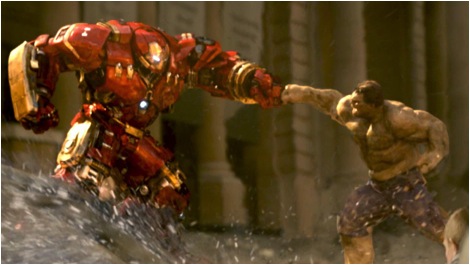The index to the entire Joss Whedon roundtable is here.
_________
Spoiler, but not a big one: Age Of Ultron’s last big action sequence ends with our heroes shooting down drones. Iron Man 3 and Captain America 2 both having ended the same way was kind of a giveaway. Marvel’s last few movies have had an surprising topicality, and this last one is no exception. But Winter Soldier got all the accolades for coming out against the surveillance state while thinkpieces on Ultron were comparatively few.
From both his recent declarations since leaving Marvel and from cursory knowledge of Hollywood, you know that doing Avengers 2 came with a few constraints. One of them was that it had to be bigger than the first one. So instead of New York, this time the whole world is the stage. This, and the growing concern over destruction porn following movies like the first Avengers and the Superman reboot, means that Avengers 2 is surprisingly filled with things like characters concerned with property damage and getting civilian victims out of the way. A subplot mandated by the future Black panther movie also gives us a passage about exploiting foreign countries’ natural resources.
We end up with would be world saviors building killer drones, taking metal from Africa to build super weapons in Asia, plus some resentful American bombings victims in Eastern Europe. Topical! Avengers 2 is a movie about America and its relationship to the world. (note the careful avoidance of the Middle East: Whedon probably knew no big budget movie from Hollywood could treat the region in a tone other than jingoistic). It all gets muddled in the necessities of having ten previous films to follow and just as many sequels to set up, but it’s probably the most explicitly relevant blockbusters of the year, and one of the few overt political statements in Whedon’s oeuvre.
Joss Whedon studied at Wesleyan under Richard Slotkin, who wrote about the myth of the American frontier in books like Regeneration through Violence. In his writing, Whedon hascertainly portrayed more than his share of Americans self actualizing through high-kicks, lasergun shots and mythical hammer blows. As a liberal he seems to struggle with this violence, though. So in Avengers 1 you get super heroes stopping SHIELD from atom bombing New York, and the organisation is purely and simply dismantled in Winter Soldier (Whedon had a nebulous role as supervising writer on all Marvel movies at the time, so I choose to consider “larger events” in these movies as at least partly his doing).
But how do you escape the violent trapping of the American myth? You can’t, Whedon seems to say. Certainly not in big blockbuster about a bunch of super strong guys. So the moral from Avengers 2 may then be “admit you failed and try again”. It’s what Tony Stark does when he builds Vision to save the world after failing to do so with Ultron, and it’s what SHIELD does when it comes back as a big warzone savior in Age Of Ultron. In the end, SHIELD has new soldiers and new Avengers to hit the bad guys with but it’s going to be different this time because they really really mean it.
Firefly is Whedon’s other big political statement. It tells the story of a bunch of rogue space cowboys, in a corner of space far from our own, where humans have had to settle after the destruction of Earth. The protagonists are on the run from the Alliance, a central interplanetary government that emerged from a civil war our heroes were on the losing side of. One of the things Whedon stressed in interviews at the time of the series was that the Alliance was essentially benign (they do end up looking bad in the movie, how much of it was a change of mind on Whedon’s part I don’t know). Our heroes were then rebelling against… what? Organised government? Bureaucracy? The loss of a certain sense of adventure?
The later one seems more likely. Joss Whedon likes comfortable modern life, but he also loves romantic stories of demons and super heroes, living on the frontier, rejuvenating through violence. His Angel is a metaphor for fighting addiction, but on a surface level it’s the story of a knight who cannot stop fighting, again and again, and I’m not convinced the metaphorical level is more important to Whedon than cool swordfights are.
Buffy, for all its reputation as a feminist show, was only so because its protagonist was female. She rarely, if ever, is confronted with outright misogyny. Occasionally she fights a phallic giant snake, but they just as often she battles standing metaphors for various non-gendered teenage fears. She fought a stupid military built demon cyborg that stood for god knows what. She also fought evil itself. Buffy was not so much about fighting patriarchy as she was about fighting for fighting’s sake.
Whedon’s adoption of combat as a value in itself is symptomatic of a post ideological left. You can identify big, systematic problems like America’s capitalistic and military dominance of the world, or patriarchy, or bureaucracy, but you don’t have any big, systematic answer for them like Marxism once provided. All that remains is the will to fight, and the hope of punching the bad guys away (metaphorically). So you tell yourself stories of people who keep punching, no matter what.

